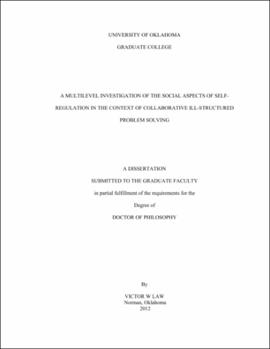| dc.contributor.advisor | Ge, Xun||Eseryel, Deniz | |
| dc.creator | Law, Wai Tung Victor | |
| dc.date.accessioned | 2019-04-27T21:24:39Z | |
| dc.date.available | 2019-04-27T21:24:39Z | |
| dc.date.issued | 2012 | |
| dc.identifier | 99167959502042 | |
| dc.identifier.uri | https://hdl.handle.net/11244/318622 | |
| dc.description.abstract | This study investigated the effect of the social aspects of self-regulation on students' ill-structured problem-solving performance in a collaborative learning environment. Specifically, two components of the social aspects of self-regulation were explored: self-regulation and co-regulation. One hundred thirty-one pre-service teachers participated in this study, which required them to collaborate with peers in groups of three or four students on an ill-structured problem-solving task. Multiple research methods were used for the study: descriptive statistics, case analysis, multilevel analyses, and correlation analyses. | |
| dc.description.abstract | The results suggested there was a wide gap between students' self-reported behaviors and the actual behavioral counted coded by the researcher regarding self-regulation and co-regulation. The students rated themselves much higher self-regulators than the researcher's ratings, particularly at the problem representation phase. Furthermore, neither self-regulation nor co-regulation had a significant impact on ill-structured problem solving. In addition, the relationship between self-regulation and ill-structured problem solving was significantly weakened as co-regulation increased. The self-report measures and behavioral count measures of self-regulation and co-regulation were significantly correlated; however, directions of the impact of co-regulation on ill-structured problem solving were opposite: the self-report measures of co-regulation had a positive impact on ill-structured problem solving while the behavioral count measures of co-regulation had a negative impact on ill-structured problem solving. Issues and limitations of the study are discussed in this chapter. The results of this study provide valuable implications for instructional design and future research. | |
| dc.format.extent | 137 pages | |
| dc.format.medium | application.pdf | |
| dc.language | en_US | |
| dc.relation.requires | Adobe Acrobat Reader | |
| dc.subject | Problem solving | |
| dc.subject | Self-control | |
| dc.subject | Self-management (Psychology) | |
| dc.title | A Multilevel Investigation of the Social Aspects of Self-Regulation in the Context of Collaborative Ill-Structured Problem Solving | |
| dc.type | text | |
| dc.type | document | |
| dc.thesis.degree | Ph.D. | |
| ou.group | Jeannine Rainbolt College of Education::Department of Educational Psychology | |
